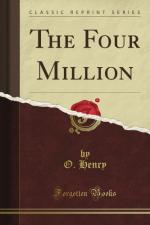Next you ascended one flight of stairs and looked at the second-floor-back at $8. Convinced by her second-floor manner that it was worth the $12 that Mr. Toosenberry always paid for it until he left to take charge of his brother’s orange plantation in Florida near Palm Beach, where Mrs. McIntyre always spent the winters that had the double front room with private bath, you managed to babble that you wanted something still cheaper.
If you survived Mrs. Parker’s scorn, you were taken to look at Mr. Skidder’s large hall room on the third floor. Mr. Skidder’s room was not vacant. He wrote plays and smoked cigarettes in it all day long. But every room-hunter was made to visit his room to admire the lambrequins. After each visit, Mr. Skidder, from the fright caused by possible eviction, would pay something on his rent.
Then—oh, then—if you still stood on one foot, with your hot hand clutching the three moist dollars in your pocket, and hoarsely proclaimed your hideous and culpable poverty, nevermore would Mrs. Parker be cicerone of yours. She would honk loudly the word “Clara,” she would show you her back, and march downstairs. Then Clara, the coloured maid, would escort you up the carpeted ladder that served for the fourth flight, and show you the Skylight Room. It occupied 7x8 feet of floor space at the middle of the hall. On each side of it was a dark lumber closet or storeroom.
In it was an iron cot, a washstand and a chair. A shelf was the dresser. Its four bare walls seemed to close in upon you like the sides of a coffin. Your hand crept to your throat, you gasped, you looked up as from a well—and breathed once more. Through the glass of the little skylight you saw a square of blue infinity.
“Two dollars, suh,” Clara would say in her half-contemptuous, half-Tuskegeenial tones.
One day Miss Leeson came hunting for a room. She carried a typewriter made to be lugged around by a much larger lady. She was a very little girl, with eyes and hair that had kept on growing after she had stopped and that always looked as if they were saying: “Goodness me! Why didn’t you keep up with us?”
Mrs. Parker showed her the double parlours. “In this closet,” she said, “one could keep a skeleton or anaesthetic or coal—”
“But I am neither a doctor nor a dentist,” said Miss Leeson, with a shiver.
Mrs. Parker gave her the incredulous, pitying, sneering, icy stare that she kept for those who failed to qualify as doctors or dentists, and led the way to the second floor back.
“Eight dollars?” said Miss Leeson. “Dear me! I’m not Hetty if I do look green. I’m just a poor little working girl. Show me something higher and lower.”
Mr. Skidder jumped and strewed the floor with cigarette stubs at the rap on his door.
“Excuse me, Mr. Skidder,” said Mrs. Parker, with her demon’s smile at his pale looks. “I didn’t know you were in. I asked the lady to have a look at your lambrequins.”




